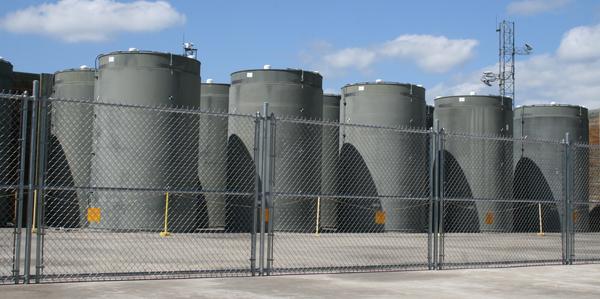This Vermont Town Took A Big Hit When Its Nuclear Plant Closed

Spent fuel at Vermont Yankee is stored in these casks. NorthStar, the company that wants to buy the closed plant, recently boosted its financial plan to pay for fuel storage. Photo courtesy of Vermont Yankee
At the end of May, the Pilgrim Nuclear Power Station in Plymouth will permanently shut down. Forty-six years ago it began generating electricity, high-paying jobs and intense controversy over safety and environmental impact.
Pilgrim went into service just one day after its sister plant: Vermont Yankee. Both reactors were the same make and model: a GE Mark I reactor. And since 2002, they have been operated by the same company: Entergy.
But Vermont Yankee closed five years ago, and its host community of Vernon — population 2,206 — has had a rough adjustment to its new social and economic reality.
“I think Vermont Yankee was a lot of Vernon’s identity,” says Town Administrator Michelle Pong. Her father retired from Vermont Yankee, and she used to do office work there during summer vacations. “We were known for being a host community of a nuclear power plant,” Pong says. “You know, they are few and far between. I mean, it’s been here for 40 years.”
There are about 60 nuclear “host communities” across the United States. And while each plant — and each community — is unique, Vernon can offer one major takeaway for towns like Plymouth: They are on their own.
“There was no one to call,” says Jonathan Cooper, research director with the Vermont-based Institute for Nuclear Host Communities. “These are commercial reactors; they’re largely in the private sector. It’s a private sector issue.”
